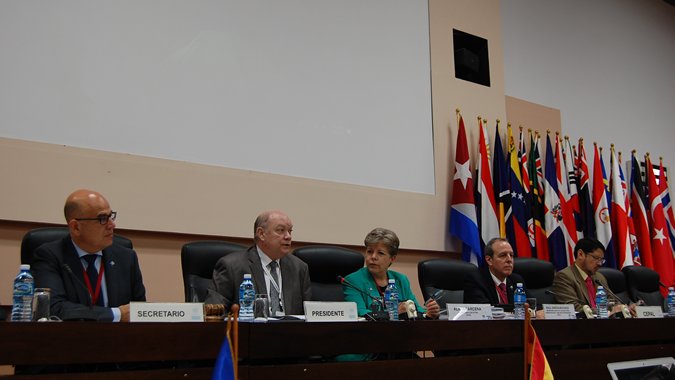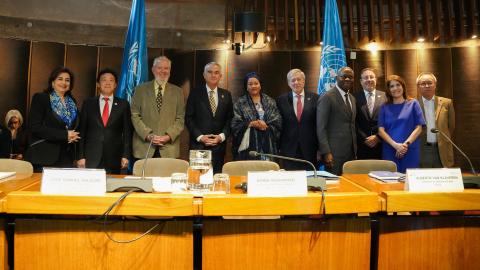Representatives of the member countries of the Economic Commission for Latin America and the Caribbean (ECLAC) highlighted the organization’s leadership and called for the strengthening of its position and its pivotal role as a space for reflection and dialogue in the fight against inequality.
During the second day of the regional commission’s thirty-seventh session, which ends on Friday, May 11 in Havana, Cuba, ECLAC presented a report on the activities carried out in the last biennial (2016-2017), and the organization’s projected work agenda through 2020.
“We want to thank ECLAC not only for the support it provides through reports and documents that are important for the region, but also for its help in other sub-regional integration processes and throughout the Americas,” affirmed the delegation from Mexico, which on Tuesday officially handed over the presidency pro tempore of the organization to Cuba.
The delegation from Paraguay underscored “ECLAC’s full commitment to economic development and to reinforcing economic relations among its members, as well as with other nations around the globe. We agree that ECLAC is Latin America and the Caribbean,” they asserted.
Canada, meanwhile, expressed “pride for being a member of ECLAC” and underscored the leadership of the Executive Secretary of the regional organization, Alicia Bárcena.
It also stated Canada’s commitment to inclusion and equality, emphasizing themes of gender and indigenous peoples.
Argentina, in its remarks, highlighted the relevance of regional integration on the 21st-century development agenda and thanked ECLAC for its contributions to bringing the MERCOSUR and the Pacific Alliance closer together.
After remarks from the countries, it was ECLAC’s subsidiary bodies’ turn to present their reports on the areas of statistics, women, social development, population and development, planning, science, innovation and information technologies and communications, and South-South cooperation.
The plenary session also addressed the Escazú Agreement on Principle 10 of the Rio Declaration on the Environment and Development, in which ECLAC’s Executive Secretary recognized the leadership of Chile and Costa Rica, countries that led the process toward approval of this first binding regional convention that guarantees the application of rights of access to information, citizen participation and justice in environmental matters in Latin America and the Caribbean.
“Our region has taken a historic step, because the Escazú Agreement is the first binding legal instrument in the region. I want to attest and pay tribute to the government of Chile’s commitment to this agreement in 2012, and to Costa Rica, which joined in 2014,” affirmed Alicia Bárcena, who also praised support from Brazil, Colombia and Mexico.
The UN high official gave thanks for the support from member countries for ECLAC’s work and pledged the organization’s commitment to continue working for sustainable development side by side with the countries of the region.
The thirty-seventh session devoted a special meeting to the promotion of a deeper commitment by the Caribbean to Latin America in order to find opportunities for growth and sustainable development.
In this context, ECLAC’s Executive Secretary presented The Caribbean Outlook, a document that offers an overview of the threats and challenges faced by the Caribbean and proposes a broad set of innovative solutions to issues that must be decidedly resolved in order for the sub-region to achieve these paths to sustainable development.
The full program for ECLAC’s thirty-seventh session, as well as general information about the meeting, is available on the website https://periododesesiones.cepal.org/37/en.
You can follow all the details of the session on social media with the hashtags #igualdadALC and #equalityLAC.




